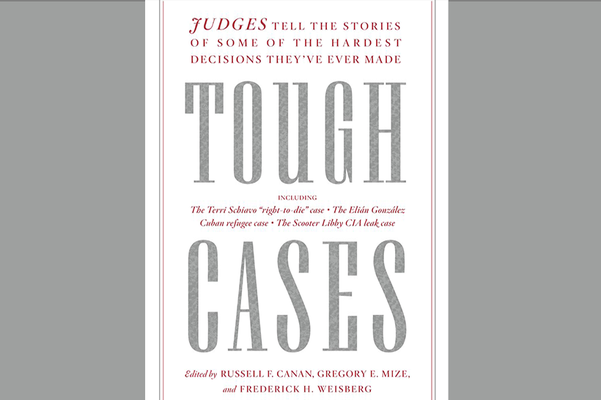Tough Cases

Generally, few judges publicly share the thought processes behind their decision making. Tough Cases: Judges Tell the Stories of Some of the Hardest Decisions They’ve Ever Made, attempts “to demystify judicial decision-making and to make the process accessible to ordinary people, who would not otherwise get a ringside seat.” The book, a collection of essays written by 13 judges who served, or are serving, on various lower courts, reveals that legal questions do not always admit one-sided answers. These judges shed light on the cases that proved most difficult for them to decide.
Tough Cases takes readers behind the scenes of nationally prominent cases, like United States v. I. Lewis ‘Scooter’ Libby, the trial of Vice President Dick Cheney’s Chief of Staff and Assistant for National Security Affairs. In a case surrounded by politically charged events that resulted in the disclosure of the identity of a CIA agent, Libby was found guilty of obstruction of justice, perjury, and making a false statement to the FBI. He was sentenced to 30 months in federal prison. His sentence was commuted by President Bush. In 2018, Libby was pardoned by President Donald Trump.
Reggie B. Walton of the U.S. District Court for the District of Columbia, the presiding judge in Libby, guides readers through the lifecycle of the case, from pretrial motions to sentencing, providing insight into the unique challenges raised along the way in this high-profile case. Among the issues discussed by Judge Walton is his reasoning behind disallowing the introduction of a memory expert, developing a strategy to accommodate media access to the proceedings and avoid disruption in the courtroom, and selecting an impartial jury in such a high profile case.
An excerpt from Judge Walton:
“As the events that occurred subsequent to the trial demonstrate, when politics are at play in a case, sometimes the facts and the law ultimately do not matter. That reality and other factors made the trial of United States v. I. Lewis “Scooter” Libby a hard case, which is inevitable when high-level political figures are the subject of criminal prosecutions. Nonetheless, I am convinced Libby received a fair trial and his convections were supported by the evidence.”
Learn more about Tough Cases.
